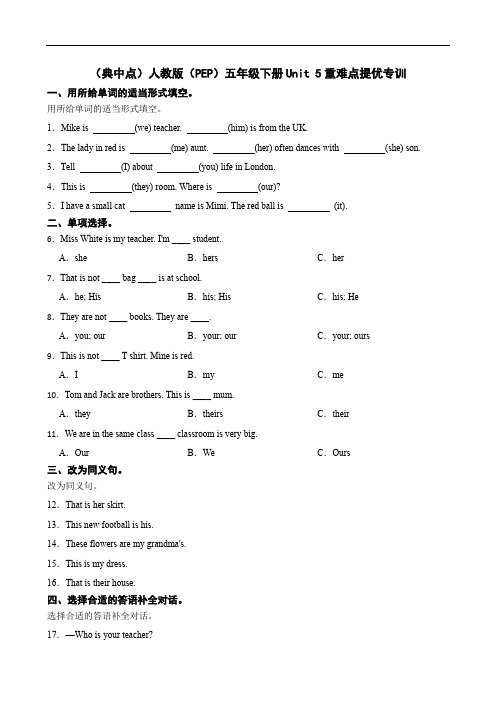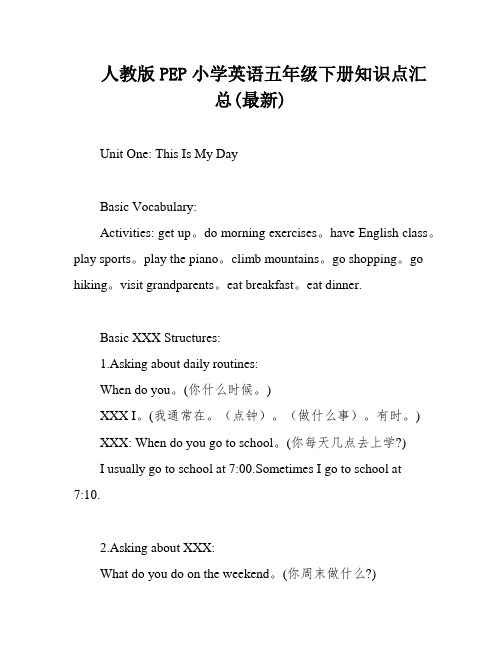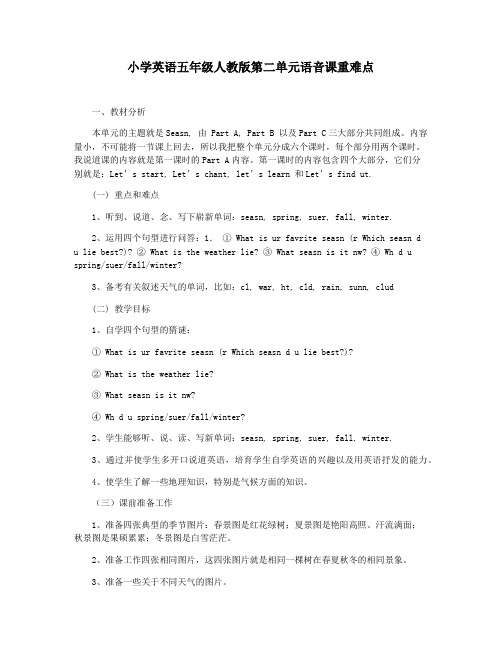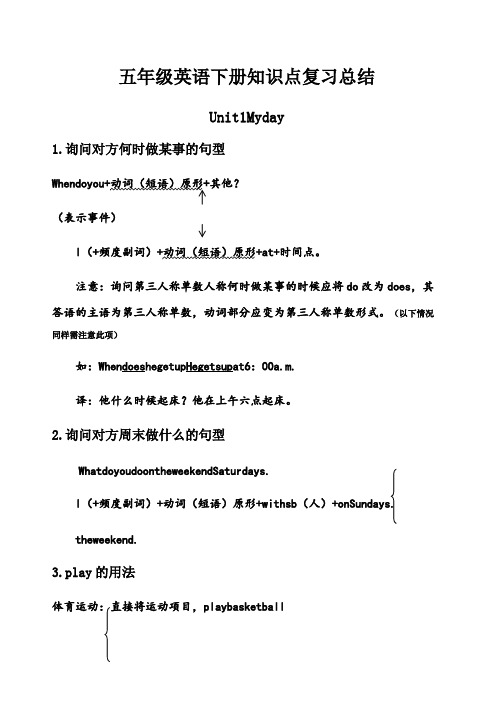人教版五年级英语下册重难点
(典中点)人教版(PEP)五年级下册Unit 5重难点提优专训

(典中点)人教版(PEP)五年级下册Unit 5重难点提优专训一、用所给单词的适当形式填空。
用所给单词的适当形式填空。
1.Mike is (we) teacher. (him) is from the UK.2.The lady in red is (me) aunt. (her) often dances with (she) son. 3.Tell (I) about (you) life in London.4.This is (they) room. Where is (our)?5.I have a small cat name is Mimi. The red ball is (it).二、单项选择。
6.Miss White is my teacher. I'm ____ student.A.she B.hers C.her7.That is not ____ bag ____ is at school.A.he; His B.his; His C.his; He8.They are not ____ books. They are ____.A.you; our B.your; our C.your; ours9.This is not ____ T shirt. Mine is red.A.I B.my C.me10.Tom and Jack are brothers. This is ____ mum.A.they B.theirs C.their11.We are in the same class ____ classroom is very big.A.Our B.We C.Ours三、改为同义句。
改为同义句。
12.That is her skirt.13.This new football is his.14.These flowers are my grandma's.15.This is my dress.16.That is their house.四、选择合适的答语补全对话。
人教版(PEP)小学英语五年级下册教案_第三单元

人教版(PEP)小学英语五年级下册教案第三单元Unit 3 My Birthday第一课时一、教学内容:Let’s learn & Let’s start、Let’s try二、教学目标:1、能够听、说、认读12个月份的名称,并能书写其缩写形式。
2、听懂并运用句子“When is your birthday?”询问对方的生日,并能用“My birthday is in ….”来表达自己生日的月份。
三、教学重难点:教学重点:听懂并运用句子“When is your birthday?”询问对方的生日,并能用“My birthday is in ….”来表达。
教学难点:能用所学的语言表达自己的生日在哪个月份,并在实际情景中运用。
四、教学准备:单词卡片、PPT五、教学过程:1、热身1. 教师播放Unit2 P14 Let’s chant的课件,让学生跟唱。
2. Look and talk(看图对话)T: Do you like spring?S1: Yes, I do..T: What’s the weather like in spring?S1: It’s warm and windy.T: What can you do in spring?S1:I can fly kites. I can plant trees.(设计意图:通过与学生交流,让学生回顾四季气候特征以及人们能在该季节进行的活动,以旧引新,自然、流畅地引入新课。
活动类型A)2、预习T: There are 4 seasons in a year.But how many months are there in a year?Ss: There are 12.T: What are they? Please listen and chant.Then tell me.教师播放五年级上册的Recycle 2 Let’s chant部分的录音,在黑板上按顺序贴出12个月份的图片(暂时不出示单词)。
小学英语人教版PEP五年级下册1-6单元知识点总结

Unit1 My day一、基本句型1.询问什么时候做某事:- When do you ……?你什么时候……?- I usually…at …. 我通常在…(点钟)…。
例:-When do you eat breakfast?-I eat breakfast at 7:00.2.What do you do on the weekend?你周末做什么?- I +频率副词+周末活动+时间。
或Sometimes I+周末活动例句:I sometimes go shopping with my mum on the weekend.(周末我时候和妈妈一起去购物)二、知识点:1.频率副词:always(总是,一直)>usually(通常)>often(经常)>sometimes(有时)2.只有Sometimes可以放在句首。
(Sometimes I cook dinner.)3.On the weekend 在周末on Saturdays 在周六on Sundays在周日(别忘加s)Unit2 My favourite season1.-Which season do you like best? (你最喜欢哪个季节?)Why?(为什么)-I like +季节+ best.(I like spring∕summer∕fall∕winter best) Because ___________.(因为)或:-What‘s your favourite season? -My favourite season is spring∕summer∕fall∕winter.2.-Why do you like winter best?(你为什么最喜欢冬天?) -Because______.二、知识点:1.leaf(树叶):复数leaves2.W,W真神奇,问出许多大问题。
what,what,问“什么”,when,when,问“时间”,where,where,问“哪里”,which,which,“哪一个”,why,why,“为什么”.Unit3 My school calendar补充:1.Dragon Boat Festival 龙舟节或端午节(农历五月五日)一般在阳历6月2.月份首字母大写。
人教版五年级下册(英语Unit 2) 知识点总结

Unit2My favourite season一、重点单词1.春天spring2.夏天summer3.秋天autumn/fall4.冬天winter5.季节season6.去野餐go on a picnic7.摘苹果pick apples8.堆雪人make a snowman9.去游泳go swimming10.因为because11.做得好good job12.哪一个which13.暑假summer vacation/holiday14.落下;秋天fall15.可爱的;美丽的lovely16.孩子们(复数)children17.最;最高程度地best18.看……look at19.天气weather20.在雪中玩play in the snow21.种花plant flowers22.吃冰激凌eat ice cream23.叶子leaf(复数leaves)24.许多lots of/a lot of25.家庭family26.到处everywhere27.热的hot二、重点句子1.Do you like the music,children?孩子们,你们喜欢这首音乐吗?2.–Which season do you like best?你最喜欢那个季节?–I like spring best.There are beautiful flowers everywhere.我最喜欢春天。
(因为)到处都有美丽的花。
3.Spring is green with flowers and songs.Summer is hot and the days are long.Autumn is golden and farmers are busy.Winter is white and the year is gone.春天花红柳绿歌声扬。
夏天炎热白昼长。
秋天金色农民忙。
冬天白色年已终。
(歌谣句子可选用于写作)4.The weather is good and the colours are beautiful!天气很好,色彩很美丽!5.I like summer,but I can’t swim.我喜欢夏天,但是我不会游泳。
人教版五年级下册英语全册易错题及答案分析

人教版五年级下册英语全册易错题及答案分析一、Unit 11. What’s this ?这是什么?答案:It’s a/an…解析:此题重点是物品的名称,特别是可数名词单数和不可数名词的分类,需要引导学生看到图片,认真观察细节。
易错点:a/an使用不正确,或者没有使用冠词;名词单数复数使用不正确。
2. What colour is it? 它是什么颜色?答案:It’s…解析:此题是通过对物品的颜色进行提问,特别是对颜色的掌握。
所以建议在此题之前,教师讲解关于颜色方面的知识,并配以图片等示范。
易错点:颜色使用不准确。
3. Is this a …? 这是一个…吗?答案:Yes, it is. / No, it isn’t.解析:此题考察对于物品的辨认和判断,而且是通过图片来进行考察的,所以学生需要通过对图片的观察和对字母的辨认和拼读能力来进行回答。
易错点:不能准确回答,并且没有理由。
二、Unit 21. Are you…? 你是…吗?答案:Yes, I am. / No, I’m not.解析:此题是考察学生对于自我的认知和身份的确认,教师可以在课堂上利用游戏、问答等方式,激发学生思考、积极参与,让学生在活动中逐渐掌握表达自己身份的语言。
易错点:不能准确表达自己的身份。
2. Is he/she…? 他/她是…吗?答案:Yes, he/she is. / No, he/she isn’t.解析:此题的重点是提高学生的认知能力和判断能力,学生需要在听到句子后能够正确地判断问句所描述的人物特征是正确还是错误,并能逐渐提高学生对人物形象和语言表达的理解能力。
易错点:不能准确回答,没有理由。
三、Unit 31. What’s the weather like…? 今天天气怎么样?答案:It’s…解析:此题考查学生对于天气表达的基本运用、对事物的观察能力、判断能力以及补全对话的能力。
易错点:适当的语序,表达方式不正确等。
人教版PEP小学英语五年级下册知识点汇总(最新)

人教版PEP小学英语五年级下册知识点汇总(最新)Unit One: This Is My DayBasic Vocabulary:Activities: get up。
do morning exercises。
have English class。
play sports。
play the piano。
climb mountains。
go shopping。
go hiking。
visit grandparents。
eat breakfast。
eat dinner.Basic XXX Structures:1.Asking about daily routines:When do you。
(你什么时候。
)XXX I。
(我通常在。
(点钟)。
(做什么事)。
有时。
)XXX: When do you go to school。
(你每天几点去上学?)I usually go to school at 7:00.Sometimes I go to school at7:10.2.Asking about XXX:What do you do on the weekend。
(你周末做什么?)XXX I。
(我通常/经常。
有时。
)XXX: What do you do on the weekend?I often play XXX I go shopping with my mom.3.Introducing one's own habits:Every weekend。
I go hiking。
(我每个周末远足。
)Every day。
I do my homework at 8:00 in the evening。
(我每天晚上8点做作业。
)4.Asking XXX:What do you do。
(你是干什么的?)Time:morning。
afternoon。
evening。
noon。
at night。
6:00.on Sunday。
小学英语五年级人教版第二单元语音课重难点

小学英语五年级人教版第二单元语音课重难点一、教材分析本单元的主题就是Seasn, 由 Part A, Part B 以及Part C三大部分共同组成。
内容量小,不可能将一节课上回去,所以我把整个单元分成六个课时,每个部分用两个课时。
我说道课的内容就是第一课时的Part A内容。
第一课时的内容包含四个大部分,它们分别就是:Let’s start, Let’s chant, let’s learn 和Let’s find ut.(一) 重点和难点1、听到、说道、念、写下崭新单词:seasn, spring, suer, fall, winter.2、运用四个句型进行问答:1.① What is ur favrite seasn (r Which seasn du lie best?)? ② What is the weather lie? ③ What seasn is it nw? ④ Wh d u spring/suer/fall/winter?3、备考有关叙述天气的单词,比如:cl, war, ht, cld, rain, sunn, clud(二) 教学目标1、自学四个句型的猜谜:① What is ur favrite seasn (r Which seasn d u lie best?)?② What is the weather lie?③ What seasn is it nw?④ Wh d u spring/suer/fall/winter?2、学生能够听、说、读、写新单词:seasn, spring, suer, fall, winter.3、通过并使学生多开口说道英语,培育学生自学英语的兴趣以及用英语抒发的能力。
4、使学生了解一些地理知识,特别是气候方面的知识。
(三)课前准备工作1、准备四张典型的季节图片:春景图是红花绿树;夏景图是艳阳高照、汗流满面;秋景图是果硕累累;冬景图是白雪茫茫。
(完整版)人教版PEP五年级下册英语知识点复习总结

五年级英语下册知识点复习总结
Unit1Myday
1.询问对方何时做某事的句型
Whendoyou+动词(短语)原形+其他? (表示事件)
I(+频度副词)+动词(短语)原形+at+时间点。 注意:询问第三人称单数人称何时做某事的时候应将 do 改为 does,其 答语的主语为第三人称单数,动词部分应变为第三人称单数形式。(以下情况
同样需注意此项)
如:WhendoeshegetupHegetsupat6:00a.m. 译:他什么时候起床?他在上午六点起床。
2.询问对方周末做什么的句型
WhatdoyoudoontheweekendSaturdays. I(+频度副词)+动词(短语)原形+withsb(人)+onSundays. theweekend.
(2)在基数词后加 th:除去 first,second,third,其他基数词变序数词一般 直接在其后加 th。注意 five 与 twelve 要先把 ve 变 f,再加 th;eight 直接加 h;nine 去 e 再加 th。
(3)整十序数词以 ieth 结尾:整十位的序数词先将十位整数词尾的 y 变为 i, 再加 eth。如:twenty-twentieth。
The
注意:play-plays 因为 a 是元音 3)以 ch,sh,s,x 或 o 结尾的动词,在后面加-es; 例如 teach-teacheswash-washesdo-doesgo-goesfix-fixes
4)不规则的; 例如 have-has
5.by 的用法
- 1、下载文档前请自行甄别文档内容的完整性,平台不提供额外的编辑、内容补充、找答案等附加服务。
- 2、"仅部分预览"的文档,不可在线预览部分如存在完整性等问题,可反馈申请退款(可完整预览的文档不适用该条件!)。
- 3、如文档侵犯您的权益,请联系客服反馈,我们会尽快为您处理(人工客服工作时间:9:00-18:30)。
Unit One This Is My Day基本词汇:Activities(活动)Time(时间)频率词get up 起床do morning exercises 晨练have English class 上英语课play sports 进行体育活动play the piano 弹钢琴climb mountains 爬山go shopping 购物go hiking 去远足visit grandparents 看望外/祖父母eat breakfast 吃早饭eat dinner 吃晚饭morning 早上in theafternoon 下午evening 晚上noon 中午at night 夜晚6:00 具体时间onSunday 在星期天when 什么时候always 总是usually 通常often 经常sometimes 有时seldom 很少never 从不(频率程度依次减低)基本句型:1. 询问生活规律:---- When do you ……?你什么时候……?---- I usually… at … Sometimes I….我通常在…(点钟)…(做什么事)。
有时…E.g. --- When do you go to school ? 你每天几点去上学?--- I usually go to school at 7:00. Sometimes I go to school at 7:10.2. 询问生活习惯:--- What do you do on the weekend? 你周末做什么?--- I usually / often ….. Sometimes I …..E.g. --- What do you do on the week?--- I often play football. Sometimes I go shopping with my mom.3. 介绍自己的生活习惯:Every weekend I go hiking. 我每个周末远足。
Every day I do my homework at 8:00 in the evening. 我每天晚上8点做作业。
4. 询问职业:--- What do you do? 你是干什么的?--- I am a doctor / nurse / policeman….5. Thank you for tellingme about your day! 谢谢你告诉我你的一天。
6. Let’s….让我们….(let’s = let us )Let’s go hiking together next Sunday. 下周我们一起去远足吧。
句型转换:1.肯定句↔一般疑问句:Iusually get up at 6:00. ↔ Doyouusually get up at 6:00? 肯定回答:Yes, I do. 否定回答:No, I don’t.(第三人称时) He eatsdinner at 6:00p.m.↔ Does he eatdinner at 6:00p.m.?2.肯定句↔否定句:I like playing the piano.↔ I don’tlike playing the piano.I canplay the piano. ↔ I can’t play the piano.3.划线提问:⑴I often go shopping on the weekend.→Whendo you go shopping ?⑵I often go shoppingon the weekend. →Whatdo you do onthe weekend?⑶I am a student. →Whatdo you do?⑷I go to school at 7:00. →Whendo you go toschool?知识延伸:⑴同义词:play sports = do sportseat breakfast/ lunch/ dinner = havebreakfast/ lunch/ dinner⑵同义句:What do you do? = What are you? 你是干什么的?⑶一般将来时:(be going to)The weather report says itis going torain tomorrow. 天气预报说明天将要下雨。
Unit Two My Favourite Season基本词汇:Season (季节) Month Festival(月份)(节日)Weather(天气)Activity(活动)spring March Tree-planting Day Women’sdayApril April Fool’s Daywindyandwarmplant treesMay Labor Day Mother’ s Daysummer June Children’s Day Dragon boatFestivalFather’ s DayJuly Party building DayAugust Army Daysunnyandhotswimfall (autumn) September Teachers’ DayMid-autumn FestivalOctober National Day HalloweenNovember Thanksgiving DayHalloweenwindyandcoolfly kiteswinter December Christmas DayJanuary New Year’s DayFebruary Spring Festivalwindyandcoldskatemake asnowman基本句型:1. 询问喜欢哪个季节:⑴--- Which season do you like best? 你最喜欢哪个季节?---I like +季节+ best. (例:I likespring∕summer∕fall∕winter best)---或:I like summer, because I can swim in the sea.⑵--- Whatis your favourite season? 你最喜爱的季节是什么?--- Spring∕summer∕fall∕winter is my favourite season.2. 询问天气:--- What is the weather like in fall inBeijing?北京秋天的天气是怎么样的?--- It is sunny and cool.3. 询问理由:--- Why do you like winter best?为什么你最喜欢冬天?--- Because I can play with snow and make asnowman.4. 询问想要做什么--- What would you like to do?--- I’d like to climb∕play sports…… ( I’d = I would )5. 询问具体季节--- What season is it in March in Beijing? 北京的三月份是什么季节?--- It is spring.6. 询问能做什么--- What can I do there? 我在那里能做什么?--- You can go to the Great Wall. 你可以去长城。
7. 询问接下来打算去哪里?(be going to一般将来时)--- Where are you going on vacation? 假期你打算去哪里?--- I am going toCanada . 我将要去加拿大。
8. Summer is fromJune to August. 六月至八月是夏天。
9. How do Ilook? 我看起来怎么样?10. Send me apostcard. 寄明信片给我。
11. How did THAThappen? 那是怎么发生的!12. Whenis the best time to go to Beijing? Fall. 什么时候最适合去北京?秋天。
知识延伸:1. 特殊疑问句:⑴which 引导的特殊疑问句,询问喜欢哪个季节:Which season do you like best?⑵why 引导的特殊疑问句,询问喜欢某个季节的原因:Why do you like summer?⑶when 引导的特殊疑问句,询问什么时候:When is the best time to go to Beijing?2. 第三人称单数形式:say—says (说) ask—asks (问) come—comes (来)3. 单复数:tree—trees (树) leaf—leaves (叶子)4. 同义词:fall—autumn 秋天5. 同义句:Which season do you like best? ----- What’s yourfavourite season?6. snowy 下雪的cloudy多云的rainy下雨的7. 相似短语:play with snow玩雪like to swim游泳( like+ to do)play in the snow 在雪地玩likeswimming 游泳( like + doing)句型转换:1. 肯定句↔一般疑问句:⑴I like summer. ↔ Doyoulike summer?肯定回答:Yes, I do. 否定回答:No, I don’t.⑵It is sunny and hot. ↔ Is it sunny and hot?肯定回答:Yes,it is. 否定回答:No, it isn’t.⑶The sky isvery blue.↔ Is the sky very blue?The leaves arecolourful. →Arethe leaves colourful?2. 划线提问:⑴I like summerbest. →Whichseason do you like best?⑵Myfavourite season is winter. →What isyour favourite season?⑶It is sunnyin May in Beijing. →What is the weather l ike in May in Beijing?⑷I’d liketo swim. →What would you like to do?全写与缩写:I am = I’m you are = you’re who is = who’sdo not = don’t can not = can’t I would = I’d let us = let’s does not = doesn’t动词原形→第三人称单数形式:普通形式直接在动词后+ s:如like→likes、ask→asks、play→plays 、come→comes特殊形式have →hasdo→doeswatch→watchesUnit 3 My birthday基本词汇:month(月份)winter spring summer fall(autumn)December(Dec.)March(Mar.)June(Jun.)September(Sept.)January(Jan.)April(Apr.)July(Jul.)October(Oct.)February(Feb.)May August(Aug.)November(Nov.)ps月份的另一种缩写形式为:仅仅大写前三个字母,如:JAN 一月、FEB二月numbers(数字)基数词o ne two three four five序数词f irst(1st)s econd(2nd)t hird(3rd)f ourth(4th)f ifth(5th)基数词e ight nine twelve twenty序数词e ighth(8th)n inth(9th)t welfth(12th)t wentieth(20th)基本句型:1. 询问生日的时间:⑴---- Whenis your / his / her birthday? 你的/ 他的/ 她的生日在什么时候?---- My / his / her birthday is in June.在六月。
